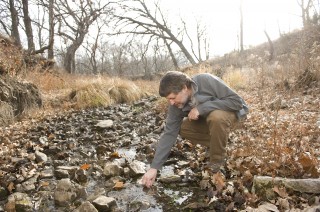Researchers Introduce Macrosystems Approach to Study Stream Ecology

Walter Dodds, Kansas State University distinguished professor of biology, is leading a research team in creating the Stream Biome Gradient Concept, which is a way to compare streams in different climates and different continents. Kansas State University
Kansas State University scientists and collaborators have developed a new method for studying a variety of streams — including tropical, prairie or forested streams — across continents.
Walter Dodds, university distinguished professor of biology, has led the researchers in creating the Stream Biome Gradient Concept, which is a way to compare streams in different climates and different continents. The concept can improve how researchers study streams worldwide.
“This model will help us understand how to regulate and conserve streams and protect water quality,” Dodds said. “It's important to think in broad terms and in the context that people, plants and animals interact with streams. Understanding biodiversity is crucial.”
The researchers have introduced the Stream Biome Gradient Concept in the Freshwater Science article “The Stream Biome Gradient Concept: factors controlling lotic systems across broad biogeographic scales.”
Other Kansas State University researchers involved include Keith Gido, professor of biology, and Bartosz Grudzinski, visiting assistant professor of geography. Other researchers include Melinda Daniels, an adjunct professor of geography at Kansas State University and associate research scientist at the Stroud Water Research Center in Pennsylvania; and Matt Whiles, professor of zoology at Southern Illinois University.
All of the researchers have studied grassland streams, which share characteristics with other desert and forested streams. They developed the Stream Biome Gradient Concept to take a macrosystems ecology approach, which involves viewing systems on a continental or national scale.
“This concept is important because most previous research has involved temperate, forested streams,” Dodds said. “We don't know exactly how that applies to streams in other areas, such as tropical, desert, prairie or tundra streams.”
The Stream Biome Gradient Concept can help develop hypotheses to test at STREON sites. STREON — or STReam Experimental Observatory Network — is a 10-year experiment at 10 different aquatic stream sites in a variety of ecosystems. STREON is part of the National Science Foundation-funded National Ecological Observatory Network, or NEON.
“We're hopeful that this work will help people develop a broader and more comprehensive view of the way that stream ecosystems function,” Dodds said. “Stream research is getting more mature and focused on large-scale questions. It's a natural progression to think in the largest possible terms and link our conceptual research to a scale where people interact with aquatic habitats.”
The researchers received funding support from the National Science Foundation, the Konza Long-Term Ecological Research program and the International Grasslands Center.
Read more at http://www.k-state.edu/media/newsreleases/jan15/dodds12115.html
Contact Information
Walter Dodds
785-532-6998
wkdodds@k-state.edu
Media Contact
All latest news from the category: Ecology, The Environment and Conservation
This complex theme deals primarily with interactions between organisms and the environmental factors that impact them, but to a greater extent between individual inanimate environmental factors.
innovations-report offers informative reports and articles on topics such as climate protection, landscape conservation, ecological systems, wildlife and nature parks and ecosystem efficiency and balance.
Newest articles

A ‘language’ for ML models to predict nanopore properties
A large number of 2D materials like graphene can have nanopores – small holes formed by missing atoms through which foreign substances can pass. The properties of these nanopores dictate many…

Clinically validated, wearable ultrasound patch
… for continuous blood pressure monitoring. A team of researchers at the University of California San Diego has developed a new and improved wearable ultrasound patch for continuous and noninvasive…

A new puzzle piece for string theory research
Dr. Ksenia Fedosova from the Cluster of Excellence Mathematics Münster, along with an international research team, has proven a conjecture in string theory that physicists had proposed regarding certain equations….



